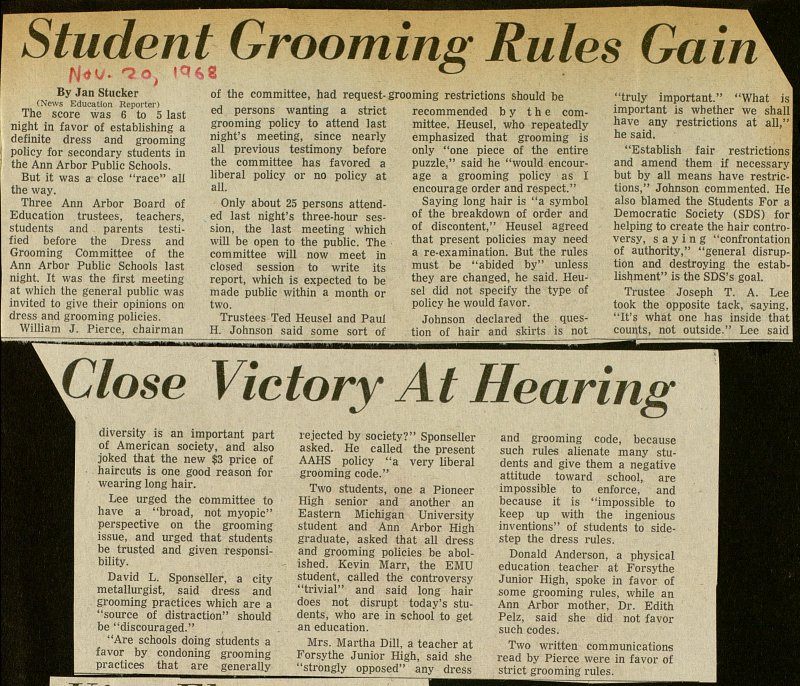Student Grooming Rules Gain Close Victory At Hearing

The score was 6 to 5 last night in favor of establishing a definite dress and grooming policy for secondary students in the Ann Arbor Public Schools. But it was a close "race" all the way. Three Ann Arbor Board of Education trustees, teachers, students and parents testified before the Dress and Grooming Committee of the Ann Arbor Public Schools last night. It was the first meeting at which the general public was invited to give their opinions on dress and grooming policies. William J. Pierce, chairman of the committee, had requested persons wanting a strict grooming policy to attend last night's meeting, since nearly all previous testimony before the committee has favored a liberal policy or no policy at all. Only about 25 persons attended last night's three-hour session, the last meeting which will be open to the public. The committee will now meet in closed session to write its report, which is expected to be made public within a month or two. Trustees Ted Heusel and Paul H. Johnson said some sort ot' grooming restrictions should be recommended b y the committee. Heusel, who repeatedly emphasized that grooming is only "one piece of the entire puzzle," said he "would encourage a grooming policy as I encourage order and respect." Saying long hair is "a symbol of the breakdown of order and of discontent," Heusel agreed that present policies may need a re-examination. But the rules must be "abided by" unless they are changed, he said. Heusel did not specify the type of policy he would favor. Johnson declared the question of hair and skirts is not "truly important." "What is important is wbether we shall have any restrictions at all," he said. "Establish fair restrictions and amend them if necessary but by all means have restrictions," Johnson commented. He also blamed the Students For a Democratie Society (SDS) for helping to créate the hair controversy, s a y i n g "confrontation of authority," "general disruption and destroying the establishment" is the SDS's goal. Trustee Joseph T. A. Lee took the opposite tack, saying, "It's what one has inside that counts, not outside." Lee said -■ -■■' ' , - diversity is an important part of American society, and also joked that the new $3 price of haircuts is one good reasori for wearing long hair. Lee urged the committee to have a "broad, not myopic" perspective on the grooming issue, and urged that students be trüsted and given responsibility. David L. Sponseller, a city metallurgist, said dress and grooming practices which are a "source of distraction" should be "discouraged." "Are schools doing students a favor by condoning grooming practices that are generally ïejected by society?" Sponseller asked. He called the present AAHS policy "a very liberal groóming code." Two students, one a Pioneer High senior and another an Eastern Michigan University student and Ann Arbor High gradúate, asked that all dress and groóming policies be abolished. Kevin Marr, the EMU student, called the controversy "trivial" and said long hair does not disrupt today's students, who are in school to get an education. Mrs. Martha Dill, a teacher at Forsythe Junior High, said she "strongly opposed" any dress and grooming code, because such rules aliénate many students and give them a negative attitude toward school, are impossible to enforce, and because it is "impossible to keep up with the ingenious inventions" of students to sidestep the dress rules. Donald Anderson, a physical education teacher at Forsythe Junior High, spoke in favor of some grooming rules, while an Ann Arbor mother, Dr. Edith Pelz, said she did not favor such codes. Two written Communications read by Pierce were in favor of strict grooming rules.
Article
Subjects
Students for a Democratic Society (SDS)
Pioneer High School - Students
Forsythe Junior High School
Education
Eastern Michigan University - Students
Ann Arbor Board of Education
Ann Arbor Public Schools - Dress and Grooming Committee
Ann Arbor News
Old News
William J. Pierce
Ted Heusel
Paul H. Johnson
Martha Dill
Kevin Marr
Joseph T. A. Lee
Edith Pelz
David L. Sponseller